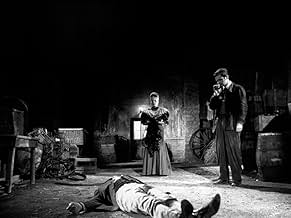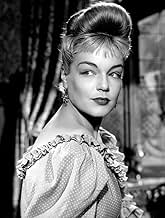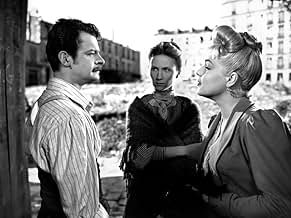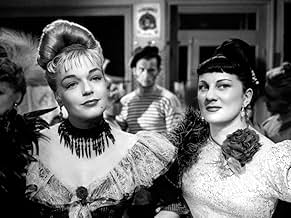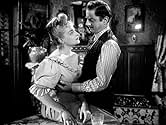IMDb-BEWERTUNG
7,6/10
6491
IHRE BEWERTUNG
Drei Gangster und ein Ex-Knacki-Tischler verlieben sich im Frankreich der Belle Époque in dieselbe schöne, goldlockige Frau.Drei Gangster und ein Ex-Knacki-Tischler verlieben sich im Frankreich der Belle Époque in dieselbe schöne, goldlockige Frau.Drei Gangster und ein Ex-Knacki-Tischler verlieben sich im Frankreich der Belle Époque in dieselbe schöne, goldlockige Frau.
- 1 BAFTA Award gewonnen
- 2 Gewinne & 2 Nominierungen insgesamt
Solange Certain
- L'amie de Paulo
- (as Solange Certin)
Émile Genevois
- Billy - membre de la bande
- (as Emile Genevois)
Empfohlene Bewertungen
Simone Signoret plays a beautiful woman of ill repute who is at the center of several men's affections - her hotheaded gangster boyfriend, an ex-criminal who's turned over a new leaf, and the leader of the gang himself. It's a pretty simple story but very well told by Jacques Becker, with the scenes involving a double cross and its brilliant ending standing out. The cinematography is wonderful, including an outdoor dance evoking the paintings of Renoir, a beautiful walk along the riverside, and the claustrophobic cells inside a police van. Signoret is radiant, defiant even as she's slapped around and with an air of sweet happiness when she's able to get away from it all, and Serge Reggiani is strong as well. Really just a solid film, one that expresses the spirit of France in the 1950's via its filmmaking, and a small window into the Belle Époque as well.
Despite the corsets and petticoats and horse-drawn cabs, this lush, richly textured film has more in common with the bleak, fatalistic modern-dress films of the period than with conventional historical romance. The action takes place over the course of only a few days, but in France that's long enough for a passion strong enough to change a life, or end it--more than one man dies because of the bewitching Marie and her golden hair that shines like the sun. The intensity of the characters' emotions and the suddenness of their violence is powerfully countered by the reserve of the playing--of the solemn, laconic toughs and of Simone Signoret as Marie. In moments of great emotion, her slight smile changes to a broad one, but with her lips still closed. There's none of the giggling and wriggling that marked the other blonde Fifties sex symbols, Bardot and Monroe, and countless others since, and obviously no nudity, total or partial, but in her morning-after scene with Serge Reggiani, you can practically smell smoke.
Like Zola's Nana, Marie is neither a villain nor a victim, simply an elemental force of nature. This elemental-woman business can, in French and non-French movies, be pretentious and unwittingly comic, but there's none of that here, because neither Signoret nor the director indulge in any fancy dialogue or vocal tricks to play up how alluring she is--they don't have to. We are always aware of Marie as a figure of enormous strength, with a broad, strong back, round shoulders spilling out of her blouse, and a mouth too wide for coyness.
In an otherwise favourable review, Pauline Kael said that the film's tone was slightly trashy, as if it were saying, of the low-life characters, "Look, they have feelings too." I disagree--the scene of the wealthy, slumming group in evening dress who find the characters "marvelously amusing" show us what Becker thinks of that viewpoint and implicitly reproaches anyone who shares it.
Like Zola's Nana, Marie is neither a villain nor a victim, simply an elemental force of nature. This elemental-woman business can, in French and non-French movies, be pretentious and unwittingly comic, but there's none of that here, because neither Signoret nor the director indulge in any fancy dialogue or vocal tricks to play up how alluring she is--they don't have to. We are always aware of Marie as a figure of enormous strength, with a broad, strong back, round shoulders spilling out of her blouse, and a mouth too wide for coyness.
In an otherwise favourable review, Pauline Kael said that the film's tone was slightly trashy, as if it were saying, of the low-life characters, "Look, they have feelings too." I disagree--the scene of the wealthy, slumming group in evening dress who find the characters "marvelously amusing" show us what Becker thinks of that viewpoint and implicitly reproaches anyone who shares it.
Jacques Becker's CASQUE D'OR (Golden Helmet 1952), an underworld romance set in Paris during "La Belle Epoque", stars Simone Signoret as the titular blonde prostitute who's star-crossed amour reveals the agony and ecstasy of love. The buxom Signoret plays Marie, the moll of an Apache gangster, who meets Manda, an ex-con gone straight, at an al fresco dance hall and it's love at first sight for both of them. The pair soon throw caution to the wind, setting off a chain-reaction of jealousy, murder, double-crosses, and revenge that can only end in tragedy. All of the characters are sharply etched but it's Simone Signoret's Marie who literally shines. The tough and tender demimonde can't take her eyes off Manda (a quiet, determined Serge Reggiani) from the moment they meet until the bitter end and she's often bathed in an ethereal light. The duplicity-free Marie is also the quintessential femme fatale who proves bad luck to any man who covets her. The era is imaginatively realized and a number of scenes are reminiscent of Impressionist paintings yet, like Marie's unconscious duality, there's darkness in the light with an undercurrent of understated but potent sex and violence. Highly recommended and loosely based on an incident in the life of a bisexual bonvivant, one Amélie Hélie:
"The bands of roughnecks of Belleville were also a passionate lot, not like the cynical pimps of Montmartre and La Chapelle. Here a man took out a knife for a girl he really cared for. In 1902 the story of 'Casque d'Or' made the headlines throughout Paris, both east and west. Two enemy bands of Apaches Mohicans de Paris - sporting their customary insignia of caps, bell-bottom trousers and polka-dotted scarves, had taken to the streets that lay between Belleville and Charonne: 'Le Popincourt' headed by the Corsican Leca, 'Les Orteaux' by Manda, l'Homme! The object of their dispute was not territory but a girl called Amélie Hélie, nicknamed 'Casque d'Or', with a stunning, golden-reddish mane. The confrontation turned into a fullscale pitched battle on Rue des Haies, in which neither knife blades nor guns were spared. To the inquisitive public prosecutor Manda retorted during his trial: 'We fought each other, the Corsican and myself, because we love the same girl. We are crazy about her. Don't you know what it is to love a girl?' Manda was unquestionably a soulmate of Piaf. Condemned to deportation and hard labour - Manda for life, Leca for eight years - the two men met on the island of Saint-Martin-de-Ré. When finally they spoke to each other, it was about 'Casque d'Or'. She meanwhile wasted no time bewailing her unfortunate suitors, but turned for solace to the world of entertainment and the company of wealthier men. However, one of Leca's faithful followers had been contemplating revenge and stabbed her one night in the establishment where she sang. Although she survived, she could no longer perform as a singer and it is only thanks to her portrayal by the legendary Simone Signoret in Jacques Becker's movie that she has not fallen into oblivion. The real Amélie Hélie ended by marrying an ordinary workman and died forgotten on 16 April 1933. She was buried in the cemetery of Bagnolet."
CASQUE D'OR's release was briefly delayed when Amélie's widower attempted to take out an injunction against it, claiming the film invaded his late wife's privacy. The case was soon thrown out when it was revealed that Hélie had appeared on stage, playing herself, in a drama entitled "Casque d'or et les Apaches".
"The bands of roughnecks of Belleville were also a passionate lot, not like the cynical pimps of Montmartre and La Chapelle. Here a man took out a knife for a girl he really cared for. In 1902 the story of 'Casque d'Or' made the headlines throughout Paris, both east and west. Two enemy bands of Apaches Mohicans de Paris - sporting their customary insignia of caps, bell-bottom trousers and polka-dotted scarves, had taken to the streets that lay between Belleville and Charonne: 'Le Popincourt' headed by the Corsican Leca, 'Les Orteaux' by Manda, l'Homme! The object of their dispute was not territory but a girl called Amélie Hélie, nicknamed 'Casque d'Or', with a stunning, golden-reddish mane. The confrontation turned into a fullscale pitched battle on Rue des Haies, in which neither knife blades nor guns were spared. To the inquisitive public prosecutor Manda retorted during his trial: 'We fought each other, the Corsican and myself, because we love the same girl. We are crazy about her. Don't you know what it is to love a girl?' Manda was unquestionably a soulmate of Piaf. Condemned to deportation and hard labour - Manda for life, Leca for eight years - the two men met on the island of Saint-Martin-de-Ré. When finally they spoke to each other, it was about 'Casque d'Or'. She meanwhile wasted no time bewailing her unfortunate suitors, but turned for solace to the world of entertainment and the company of wealthier men. However, one of Leca's faithful followers had been contemplating revenge and stabbed her one night in the establishment where she sang. Although she survived, she could no longer perform as a singer and it is only thanks to her portrayal by the legendary Simone Signoret in Jacques Becker's movie that she has not fallen into oblivion. The real Amélie Hélie ended by marrying an ordinary workman and died forgotten on 16 April 1933. She was buried in the cemetery of Bagnolet."
CASQUE D'OR's release was briefly delayed when Amélie's widower attempted to take out an injunction against it, claiming the film invaded his late wife's privacy. The case was soon thrown out when it was revealed that Hélie had appeared on stage, playing herself, in a drama entitled "Casque d'or et les Apaches".
In a poll in 1979 ,Becker's chef d'oeuvre was part of the top ten of the best French movies of all time.
It's arguably Becker's best work;he achieved a luminous movie with many unforgettable scenes : -the small boats on the river,and the pack arriving at the guinguettes,those cafes down by the river Seine which are no longer part of the landscapes.(remember Duvivier's "la belle équipe" ,1936) -all the scenes in the country where the nature seems to protect the lovers as a mother would do.Most of all,this admirable sequence when Reggiani 's sleeping :he opens his eyes and Marie's luminous beauty moves him deeply -never a director filmed Signoret as Becker did- -The scene which climaxes the opus is the one in the church.They hear the whole congregation sing the "Kyrie " in a tiny church:there's a wedding there.So Marie urges Manda to come in and they attend the ceremony.When they leave ,they learn tragic news.Now the bell is tolling for them,even if these are wedding bells.
-The final scenes between Reggiani/Manda and his old pal Bussières /Raymond display Becker's love of loyalty,manly friendship ,a subject which would come back in later works ,muted in "touchez pas au grisbi" and became an absolute pessimism in "le trou" where nobody could be trusted anymore.
-The score which Becker used in the last sequences is none other than the old French folk song "le temps des cerises" actually an organizing song,a revolutionary song ,since it was the anthem of the Commune in 1871.
"Casque d'or" is one of the jewels of the French cinema.Becker used to like the Apaches (=ruffians) ,the outcast,cause he would transfer Leblanc's Arsene Lupin adventures to the screen in 1957.A failed attempt though.But "Casque d'or" generally looked upon as Becker's peak ,hasn't aged a bit.
It's arguably Becker's best work;he achieved a luminous movie with many unforgettable scenes : -the small boats on the river,and the pack arriving at the guinguettes,those cafes down by the river Seine which are no longer part of the landscapes.(remember Duvivier's "la belle équipe" ,1936) -all the scenes in the country where the nature seems to protect the lovers as a mother would do.Most of all,this admirable sequence when Reggiani 's sleeping :he opens his eyes and Marie's luminous beauty moves him deeply -never a director filmed Signoret as Becker did- -The scene which climaxes the opus is the one in the church.They hear the whole congregation sing the "Kyrie " in a tiny church:there's a wedding there.So Marie urges Manda to come in and they attend the ceremony.When they leave ,they learn tragic news.Now the bell is tolling for them,even if these are wedding bells.
-The final scenes between Reggiani/Manda and his old pal Bussières /Raymond display Becker's love of loyalty,manly friendship ,a subject which would come back in later works ,muted in "touchez pas au grisbi" and became an absolute pessimism in "le trou" where nobody could be trusted anymore.
-The score which Becker used in the last sequences is none other than the old French folk song "le temps des cerises" actually an organizing song,a revolutionary song ,since it was the anthem of the Commune in 1871.
"Casque d'or" is one of the jewels of the French cinema.Becker used to like the Apaches (=ruffians) ,the outcast,cause he would transfer Leblanc's Arsene Lupin adventures to the screen in 1957.A failed attempt though.But "Casque d'or" generally looked upon as Becker's peak ,hasn't aged a bit.
Marie supports a bonnet made of gold, her hair encapsulates, entwines and folds, she's a hoodlum's fancy doll, not the happiest of moll, but then Georges Manda starts to dance, and takes a hold. A few days later theirs a fight behind a bar, the two adversaries will scrap and fight and spar, with a blade casually tossed, by Leca, the gangster boss, leaving one with injuries, that will not scar.
Still an engrossing tale of love, honour and deceit, all centred around Marie, beautifully portrayed and performed by Simone Signoret, as she tries to escape the gangs and back alleys of Paris for a man she's recently fallen for.
Still an engrossing tale of love, honour and deceit, all centred around Marie, beautifully portrayed and performed by Simone Signoret, as she tries to escape the gangs and back alleys of Paris for a man she's recently fallen for.
Wusstest du schon
- WissenswertesLiterary critics at the time were outraged by the fact that Jacques Becker chose to emphasize atmospherics at the expense of psychology. Nevertheless, Becker's approach had a profound effect on the young film-makers that would later go on to form the French New Wave, thereby changing French cinema forever.
- Zitate
[English subtitled version]
Old Woman Joinville Bar Patron: Charming! We can't go anywhere without meeting tarts.
- VerbindungenEdited into Apostrophes: Les plaisirs populaires (1989)
- SoundtracksSobre las Olas
(uncredited)
Music by Juventino Rosas
[The music to which Marie reluctantly dances with Roland at Joinville]
Top-Auswahl
Melde dich zum Bewerten an und greife auf die Watchlist für personalisierte Empfehlungen zu.
- How long is Casque d'Or?Powered by Alexa
Details
- Erscheinungsdatum
- Herkunftsland
- Sprache
- Auch bekannt als
- Casque d'Or
- Drehorte
- Produktionsfirmen
- Weitere beteiligte Unternehmen bei IMDbPro anzeigen
Box Office
- Weltweiter Bruttoertrag
- 1.413 $
- Laufzeit
- 1 Std. 25 Min.(85 min)
- Farbe
- Seitenverhältnis
- 1.37 : 1
Zu dieser Seite beitragen
Bearbeitung vorschlagen oder fehlenden Inhalt hinzufügen

